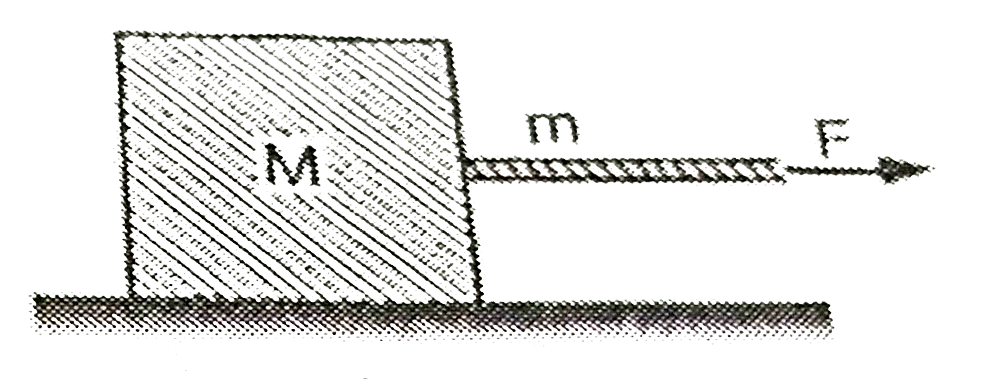A block of mass M is pulled along a horizontal frictionless surface by a rope of mass m, as shown in Fig. 5-35. A horizontal force acts on one end of the rope.

(a) Show that the rope must sag, even if only by an imperceptible amount.
(b) Then, assuming that the sag is negligible, find the acceleration of rope and block.
(c) Find the force on the block from the rope.
(d) Find the tension in the rope at its midpoint.
(a) Show that the rope must sag, even if only by an imperceptible amount.
Reasoning: A small segment of the rope has mass and is pulled down by the gravitational force of the Earth. Equilibrium is reached because neighboring portions of the rope pull up sufficiently on it. Since tension is a force along the rope, at least one of the neighboring portions must slope up away from the segment we are considering. Then, the tension has an upward component, which means the rope sags.
(b) Then, assuming that the sag is negligible, find the acceleration of rope and block.
The only force acting with a horizontal component is the applied force →F. Treat the block and rope as a single object.
Calculation: We write Newton.s second law for it: F=(M+m)a, where a is the acceleration and the positive direction is taken to be to the right. The acceleration is given by a=F/(M+m).
(c) Find the force on the block from the rope.
Calculation: The force of the rope Fr is the only force with a horizontal component acting on the block. Then Newton.s second law for the block gives
Fr=Ma=MFM+m
where the expression found above for a has been used. (d) Find the tension in the rope at its midpoint.
Calculation: Treating the block and half the rope as a single object, with mass M+1/2m, where the horizontal force on it is the tension Tm at the midpoint of the rope, we use Newton.s second law:
Tm=(M+12m)a
=(M+m/2)F(M+m)
=(2M+m)F2(M+m).
Topper's Solved these Questions
- BOOK - RESNICK AND HALLIDAYCHAPTER - FORCE AND MOTION - I EXERCISE - CHECKPOINT5videos
FORCE AND MOTION - I
- BOOK - RESNICK AND HALLIDAYCHAPTER - FORCE AND MOTION - I EXERCISE - PROBLEMS52videos
FORCE AND MOTION - I
- BOOK - RESNICK AND HALLIDAYCHAPTER - FLUIDSEXERCISE - PRACTICE QUESTIONS (Integer Type )5videos
FLUIDS
- BOOK - RESNICK AND HALLIDAYCHAPTER - FORCE AND MOTION-IIEXERCISE - PRACTICE QUESTIONS (Integer Type)1videos
FORCE AND MOTION-II
Similar Questions

A block of mass 2 m is pulled along a horizontal frictionless surface by a rope of mass m as shown in the figure given above. What force is exerted by the rope on the block ?View SolutionA block of mass M is pulled along a horizontal frictionless surface by a rope of mass m. If a force F is applied at one end of the rope. Find the force which the rope exerts on the block.
View Solution
Knowledge Check
- Question 1 - Select One
A block of mass 2 m is pulled along a horizontal frictionless surface by a rope of mass m as shown in the figure given. What force is exerted by the rope on the block ?
 AF3BF2C2F3DF
AF3BF2C2F3DF - Question 2 - Select One
A block of mass M is pulled along a horizontal frictionless surface by a rope of mass m. If a force F is applied at one end of the rope, the force which the rope exerts on the block is :
AF/(M+m)BFCFM(m+M)D0 - Question 3 - Select One
A block of mass M is pulled along a horizontal frictionless surface by a rope of mass m . Force P is applied at one end of rope. The force which the rope exerts on the block is:
AP(M−m)BPM(m+M)CPM(m+M)DPM(M−m)
A block of mass M is pulled along a horizontal frictionless surface by a rope of mass m. If a force P is applied at the free end of the rope , the force exerted by the rope on the block .
View SolutionA block of mass M is pulled along a horizontal frictionless surface by a rope of mass m. If a force P is applied at the free end of the rope, the force exerted by the rope on the block will be
View SolutionA block of mass M is pulled along a horizontal frictionless surface by a rope of mass m as shown in A horizontal force F is applied to one end of the rope. Find
(a) the acceleration of the rope and block
(b) the force that the rope exerts on the block
(c) the tension in the rope at its mid point
 View Solution
View SolutionA block of mass M is pulled along a horizontal frictionless surface by a rope of mass m. If a force P is applied at the free end of the rope, the force exerted by the rope on the block is
View SolutionA block of mass M is pulled along a horizontal frictionless surface by a rope of mass m. If a force P is applied at the free end of the rope, the force exerted by the rope on the block is
View Solution
